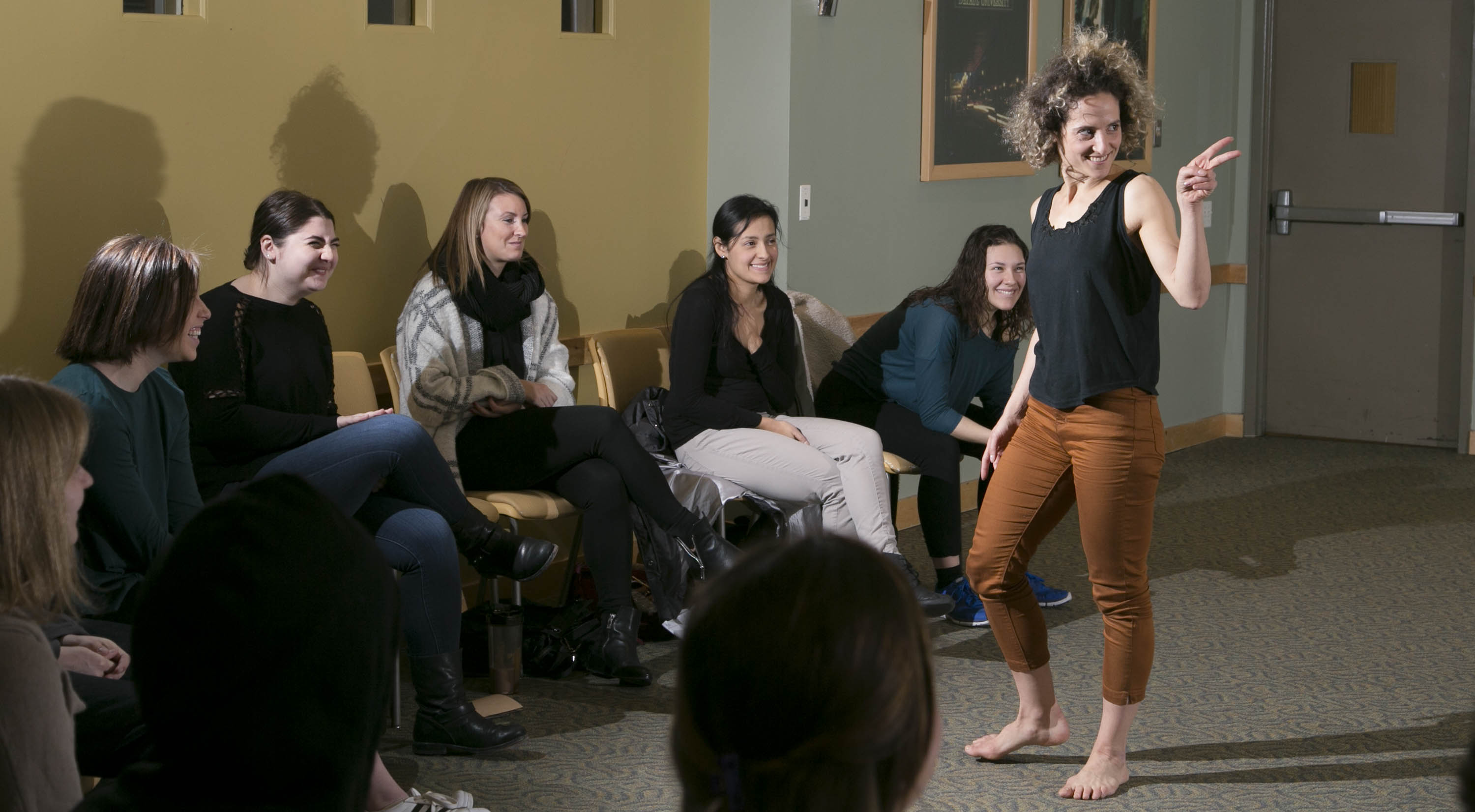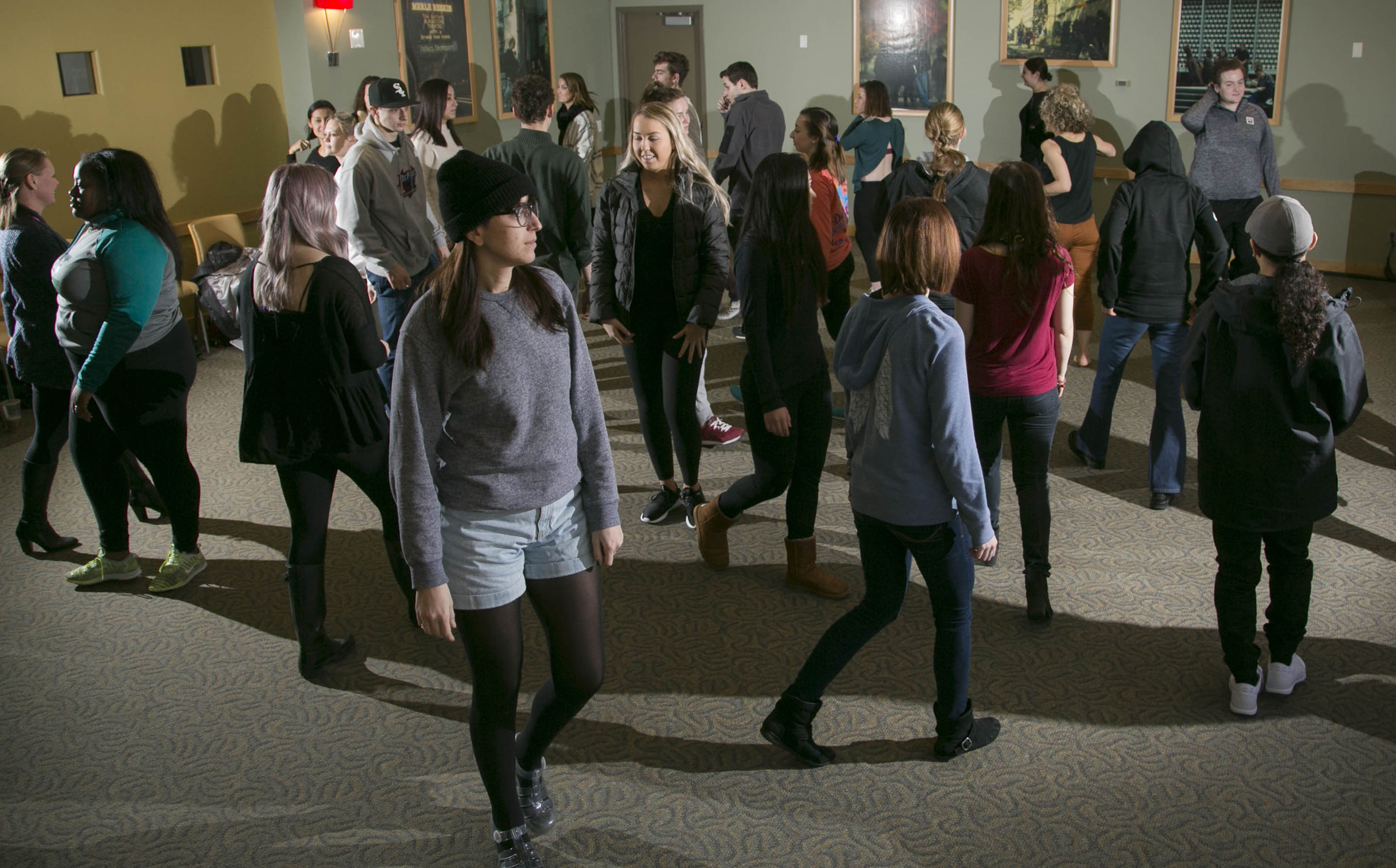 As part of Lin Kahn's "Diversity in Dance: Paradigms Shifting" course, students are able to engage with Israeli multicultural dance partners, Miriam Engel and Sergey Shamota. (DePaul University/Arielle Toub)From self-expression to increased physical skill, not to mention a reduction in stress and anxiety, the benefits of dance are numerous. For Lin Batsheva Kahn, a faculty member in The Theatre School, dance can provide at least one additional benefit: a gateway to talking with her students about “isms” — specifically racism, sexism, ageism and ableism.
As part of Lin Kahn's "Diversity in Dance: Paradigms Shifting" course, students are able to engage with Israeli multicultural dance partners, Miriam Engel and Sergey Shamota. (DePaul University/Arielle Toub)From self-expression to increased physical skill, not to mention a reduction in stress and anxiety, the benefits of dance are numerous. For Lin Batsheva Kahn, a faculty member in The Theatre School, dance can provide at least one additional benefit: a gateway to talking with her students about “isms” — specifically racism, sexism, ageism and ableism.
To begin that type of conversation, Kahn developed the course “Diversity in Dance: Paradigms Shifting,” which she teaches to sophomores, juniors and seniors representing a variety of majors.
“The intention of the class is to reduce and eliminate stereotyping, bias and prejudice through the lens of dance. When I constructed the course, I chose to focus on four ‘isms’ and work towards replacing those attitudes with not just tolerance, but appreciation and value. Students look at the world of dance to study individuals and groups who are thriving despite negative stereotypes about gender, ethnicity, age, and those who are other-abled,” Kahn says.
“Dance is a remarkable universal language that transcends interpersonal obstacles,” she adds.
Discussion around racism includes studying the career of Misty Copeland, who in 2015 became the first African-American woman promoted to principal dancer in the American Ballet Theatre’s 75-year history.
For ageism, students might study Mikhail Baryshnikov, one of the most well-known male ballet dancers in history, who was still performing well into his 60s. When the discussion of sexism comes up, Kahn’s classes look at how the terms strength, power, grace and elegance are used differently for male and female ballet performers.
And, for ableism, she uses the Axis Dance Company from Oakland, California, as an example, which is a professional, physically integrated dance company that unites the talents of dancers both with and without disabilities.
 Students perform together in a Center for Identity, Inclusion and Social Change workshop with Lin Kahn’s "Diversity in Dance: Paradigms Shifting" course. (DePaul University/Arielle Toub)“Students have shared that approaching these topics through dance has made a significant difference in their thinking,” Kahn says. “They have been brought out of paradigm paralysis through studying dancers who dispute these harmful attitudes with a ‘yes I can!’ mentality.”
Students perform together in a Center for Identity, Inclusion and Social Change workshop with Lin Kahn’s "Diversity in Dance: Paradigms Shifting" course. (DePaul University/Arielle Toub)“Students have shared that approaching these topics through dance has made a significant difference in their thinking,” Kahn says. “They have been brought out of paradigm paralysis through studying dancers who dispute these harmful attitudes with a ‘yes I can!’ mentality.”
Students write a first paper about their own stereotypes, biases and prejudices; how they began; where they show up now; how they are reinforced by media; and the benefits of making a paradigm shift in thinking for themselves and others.
“One thing I really enjoyed about the class were the conversations with classmates who came to DePaul from a diverse set of countries and brought different beliefs and backgrounds to the group discussions,” says Abdullah Aleisawi, a junior finance major from Jordan.
“In addition, the videos we watched and the guest speakers we had were inspiring. Packaged together, the class was helpful in identifying stereotypes that many of us carry and providing concrete examples of people in dance who are breaking those stereotypes,” Aleisawi says.
For a final project, paired students address paradigm shifts as the result of an interview/learning conversation with someone who represents one of the four “isms.” They also write a comprehensive paper.
“My hope is that after the course ends, students take authentic paradigm shifts with them about racism, ageism, sexism and ableism, and that they experience deep meaningful learning to actively apply in their daily life beyond the classroom,” Kahn says. “I want students to have a positive impact on others through suspending judgement, being curious, asking clean neutral questions, and having empathy. It was very gratifying when Abdullah shared that my class taught him to suspend judgement and look at people for who they truly are.”
A 2017 DePaul Excellence in Teaching Honoree, Kahn is an artist-educator and established choreographer. She has received numerous grants from DePaul’s Office of Institutional Diversity and Equity for her teaching/performance event where she brings in multicultural dance partners Miriam Engel and Sergey Shamota from Israel to interact with her students.
Students can take the course as part of the LSP 200 sophomore seminar requirement. Kahn will next teach the course during the winter and spring 2019-20 quarters.